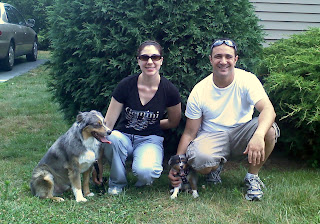
Ten years ago I was hearing about positive reinforcement training for the first time and I have to admit that it struck me as well intentioned hubris. Correcting at the end of a leash connected to a choke chain was standard operating procedure for me and many other trainers. When I first saw my friend and fellow trainer Ron sporting a bait bag, he might just as well walked into the room dressed in bunny pajamas made by his auntie. It seemed very silly. I've learned quite a bit since then, perhaps most important of all is that there's so much still left to learn. New and intriguing ideas are emerging all the time; that keeps me on my toes and forever humble. Yesterday I worked with a young bright, Mini Aussie, "Hef". It was his 'Down/Stay' lesson, the goal for the lesson was for Hef to go to 'place', a designated spot away from the door when he heard the door bell and sit/stay. Next, he was to respond to a hand signal for 'down' from the door, stay in down while his owners took turns opening the door. The idea of establishing goals is very important. Goals give relevance to the training effort. I'm training for down/stay because I don't want my dog at the door when someone rings the bell. Goals can open a broader dialogue with dog owners about the science of training, training theory, subjectivity, etc. In this case, Hef progressed so quickly, we were able to push our established goal to emphasize going to place without excessive barking, something Hef was prone to. There are a lot of reasons why dogs bark. Experienced handlers can differentiate between a bark that's intended to communicate "go away" from one that says "Come in! Come in! Come in!". Hef's was the prior. While not unfriendly, the doorbell and what it was predictive of, was a source of stress for him. In other words the doorbell made him upset. In these cases, a quiet go to place and stay is as much about bring an end to the commotion as it is about teaching your dog to reevaluate an scenario so that it's predictive of something positive. Doorbells no longer make me upset, they make rewards happen but only when I go to place, stay, respond to a 'down' instruction and let my humans open the door. The question now was whether Hef could do the problem solving necessary to realize it was his barking that was getting in the way of getting a reward for doing the aforementioned. It's in this paradigm that positive reinforcement is so intriguing. If the reward is compelling enough, taking it out of the equation gives pause to reevaluate. Hef was asking himself "What did I do to screw that up?". If he's going to change the paradigm to one that makes the reward come back into the picture, he's got to figure out the answer to that question. It didn't take long, and while it remains a work in progress, watching Hef problem solve and be rewarded for arriving at the right conclusion is simply put, the reason I like doing this so much. Life is in part about learning from our mistakes and it seems that idea is not limited to we humans. to err is canine as well.


